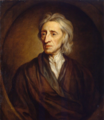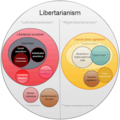Portal:Libertarianism
Introduction
Libertarianism (from French: libertaire, itself from the Latin: libertas, lit. 'freedom') is a political philosophy that places a strong emphasis on the value of liberty. Libertarians advocate for the expansion of individual autonomy and political freedom, emphasizing the principles of equality before the law and the protection of civil rights, including the rights to freedom of association, freedom of speech, freedom of thought and freedom of choice. Libertarians often oppose authority, state power, warfare, militarism and nationalism, but some libertarians diverge on the scope of their opposition to existing economic and political systems. Various schools of libertarian thought offer a range of views regarding the legitimate functions of state and private power. Different categorizations have been used to distinguish various forms of Libertarianism. Scholars have identified distinct libertarian perspectives on the nature of property and capital, typically delineating them along left–right or socialist–capitalist axes. The various schools of libertarian thought have also been shaped by liberal ideas.
In the mid-19th century, libertarianism originated as a form of left-wing politics such as anti-authoritarian and anti-state socialists like anarchists, especially social anarchists, but more generally libertarian communists/Marxists and libertarian socialists. These libertarians sought to abolish capitalism and private ownership of the means of production, or else to restrict their purview or effects to usufruct property norms, in favor of common or cooperative ownership and management, viewing private property in the means of production as a barrier to freedom and liberty. While all libertarians support some level of individual rights, left-libertarians differ by supporting an egalitarian redistribution of natural resources. Left-libertarian ideologies include anarchist schools of thought, alongside many other anti-paternalist and New Left schools of thought centered around economic egalitarianism as well as geolibertarianism, green politics, market-oriented left-libertarianism and the Steiner–Vallentyne school. After the fall of the Soviet Union, libertarian socialism grew in popularity and influence as part of anti-war, anti-capitalist and anti- and alter-globalisation movements. (Full article...)
Selected article
Classical liberalism is a political philosophy committed to the ideal of limited government and liberty of individuals, including freedom of religion, speech, press, assembly and free markets.
Classical liberalism developed in the 19th century in Western Europe and the Americas. Although classical liberalism built on ideas that had already developed by the end of the 18th century, it advocated a specific kind of society, government and public policy required as a result of the Industrial Revolution and urbanization. Notable individuals who have contributed to classical liberalism include Jean-Baptiste Say, Thomas Malthus and David Ricardo. It drew on the economics of Adam Smith, a psychological understanding of individual liberty, natural law and utilitarianism and a belief in progress. Classical liberals established political parties that were called "Liberal", although in the United States classical liberalism came to dominate both existing major political parties. There was a revival of interest in classical liberalism in the 20th century led by Friedrich Hayek and Milton Friedman.
In the late 19th century, classical liberalism developed into neo-classical liberalism, which argued for government to be as small as possible in order to allow the exercise of individual freedom. In its most extreme form, it advocated social Darwinism. Right-libertarianism is a modern form of neo-classical liberalism. The term "classical liberalism" was applied in retrospect to distinguish earlier 19th-century liberalism from the newer social liberalism. Classical liberalism is also sometimes used to refer to all forms of liberalism before the 20th century whereas some American conservatives and libertarians use it to describe their belief in the primacy of economic freedom and minimal government. However, it is not always clear which meaning is intended.
Selected quote
| “ | But what the Left That Was demanded was not the symbolic image of the "broken rifle" - so very much in vogue these days in pacifist boutiques - but the training and arming of the people for revolutionary ends, solely in the form of democratic militias. A resolution coauthored by Luxemburg and Lenin (a rare event) and adopted by the Second International in 1906 declared that it "sees in the democratic organization of the army, in the popular militia instead of the standing army, an essential guarantee for the prevention of aggressive wars, and for facilitating the removal of differences between nations.
This was not simply an antiwar resolution, although opposition to the war that was fast approaching was the principal focus of the statement. The arming of the people was a basic tenet of the Left That Was, and pious demands for gun control among today's leftists would have been totally alien to the thinking of the Left That Was. As recently as 1930s, the concept of "the people in arms" remained a basic tenet of independent socialist, no to speak of anarchist, movements throughout the world, including those of the United States, as I myself so well remember. The notion of schooling the masses in reliance on the police and army for public safety, much less turning the other cheek in the face of violence, would have been regarded as heinous. |
” |
| — Murray Bookchin (1921–2006) Social Anarchism or Lifestyle Anarchism (1995) |
Selected picture
 |
General images
Selected biography -
Nicholas Joel Sarwark (born August 27, 1979) is an American attorney and businessman who served as the 19th chair of the Libertarian National Committee (LNC), the governing body of the Libertarian Party. Prior to his election in 2014, he served on several LP national committees and as chair of the Libertarian Party of Maryland State Committee and vice chair of the Libertarian Party of Colorado State Committee. As of 2020[update], he is the only LP chair to have served three consecutive terms.
Sarwark declined to run for another term as LNC chair in 2020, and was succeeded by Joe Bishop-Henchman. (Full article...)Related portals
Parent portals
Socio-political portals
Topics
Categories
Points of interest
| Points of interest related to Libertarianism on Wikipedia: History – Portal – Category – WikiProject – Alerts – Deletions – Assessment |
Associated Wikimedia
The following Wikimedia Foundation sister projects provide more on this subject:
-
Commons
Free media repository -
Wikibooks
Free textbooks and manuals -
Wikidata
Free knowledge base -
Wikinews
Free-content news -
Wikiquote
Collection of quotations -
Wikisource
Free-content library -
Wikiversity
Free learning tools -
Wiktionary
Dictionary and thesaurus



































